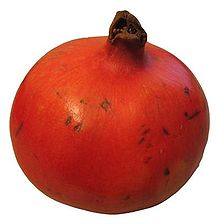Pommy


Pommy , also known as Pommie , often shortened to Pom , is a nickname for the British or English that is used jokingly or insultingly in Australian and New Zealand English .
etymology
The term is first attested in 1912 and is probably due to the Australian rhyming slang , i.e. the colloquial replacement of certain words with rhyming words , a linguistic phenomenon that is known in English primarily in connection with the Cockney rhyming slang of the London proletariat. Pommie is therefore a shortening of the word pomegrenate , " Pomegranate ," which in rhyming slang so from 1912 instead of immigrant , was needed, "immigrants", or rather, instead of in 1844 documented and equally important, though already disparaging colored slang term jimmy grant ( a compound that in turn is made up of the commonplace or placeholder name “ Jimmy ” and grant , “Fördergeld, grant, loan”, also “settlement patent , land donation”; the mixed form pommygrant is also attested ). The abuse as pomegrenate is also specifically aimed at the cancer-red complexion , by which it is easy to recognize newcomers from milder climes, whose skin has not yet got used to the glow of the Australian sun, and last but not least, the expression is probably also jokingly based on Limey to understand an older, 1888 testified Australian nickname for Brits (especially fresh from the British motherland landed settlers), who actually also called a fruit, namely the lime (English lime ).
More often read, but referring to the realm of legend, is the folk etymology , according to which Pom was originally an acronym for Prisoners of Her / His Majesty ([* POHM], "Prisoner of Her / His Majesty") or for prisoner of Mother England ([* POME], "Prisoner of Mother England"), thus referring to the origins of the Australian nation as a penal colony.
The term ten pound pom (" ten pound pom ") dates from the time after the Second World War . This meant immigrants from Great Britain who had their emigration subsidized by the Assisted Passage Scheme of the Australian (from 1945) or New Zealand (from 1947) government; 10 pounds sterling roughly corresponded to the tariff at that time for the crossing from England to Australia or New Zealand.
Today, the term pommy is mainly used in sport and especially in cricket , a sport in which England and Australia have always been arch-rivals. In 2006 and 2010, respectively, the Australian advertising supervisory board , then the New Zealand media supervisory board , had to deal with the word after various petitioners had argued that Pommy was a racist or at least xenophobic abuse that was inappropriate in advertising and public broadcasting should be put on the black list of forbidden swear words, on which the " N-word ", the " F-word " and the " C-word " can be found. Both lawsuits were dismissed on the grounds that the term was used and understood more playfully, if not a loving nickname, than as a malicious or even xenophobic insult.
Web links
- Lemma pommy in the compilation Meanings and Origins of Australian Words and Idioms by the Australian National University.
- Lemma pom in the Australian National Dictionary , online edition (Oxford University Press, 1988 f.).
- David Mikkelson: Etymology of Pommy: Is the slang word 'pom' taken from the phrase 'Prisoner of His Majesty'? , on the snopes.com website on July 8, 2007.
Individual evidence
- ↑ Amanda Laugesen: Word Watch: Ten Pound Poms , article in ANU Reporter 45: 3, 2014.
- ^ Pom ruled not offensive , reported in The Sunday Telegraph (online edition) of December 24, 2006.
- ↑ 'Pommy git' okay, BSA rules , report in The New Zealand Herald (online edition) of 26 April of 2010.